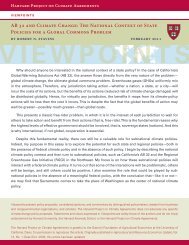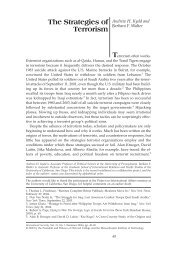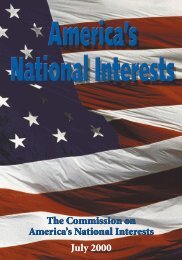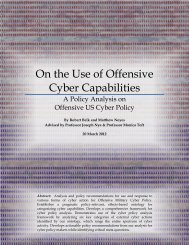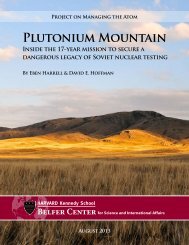Using Economic Sanctions to Prevent Deadly Conflict Elizabeth S ...
Using Economic Sanctions to Prevent Deadly Conflict Elizabeth S ...
Using Economic Sanctions to Prevent Deadly Conflict Elizabeth S ...
You also want an ePaper? Increase the reach of your titles
YUMPU automatically turns print PDFs into web optimized ePapers that Google loves.
are primarily an effort at conflict prevention, they may also have long term conflict containment goals.Haiti is the most difficult case <strong>to</strong> classify because conflict dampening was not an immediate priority ofthe sanctions. However, since civil war was a long term danger in Haiti had the military junta remainedin power, there was a conflict prevention aspect <strong>to</strong> these sanctions. Hence, these three efforts shed ligh<strong>to</strong>n the ability of forceful sanctions <strong>to</strong> control conflict.Absence of New Spoilers. No spoiler state (or black knight) emerged in these three cases, or inany of the other fifteen cases. In both the Yugoslav and Iraq cases, one might have expected Moscow <strong>to</strong>play this role. Russia and Serbia have his<strong>to</strong>ric ties based on culture and ethnicity. However, whileRussia was more supportive of the Yugoslav position on Bosnia-Herzegovina than were Western states,it neither broke the sanctions nor <strong>to</strong>ok other counter-measures as the Soviet Union did <strong>to</strong> support Cubaduring the cold war. The Soviet Union was also intermittently friendly with Iraq during the cold war,but Moscow supported the 1990 UN sanctions on Iraq and has not undercut them.Since the end of the cold war, China has come the closest <strong>to</strong> becoming a spoiler but has notcrossed the line. China has sold M-11 missiles, or at least the technology <strong>to</strong> make them, <strong>to</strong> Pakistan;helped Algeria build a nuclear power plant; and assisted Iran's nuclear and chemical weaponsprograms. 36 China also blocked an agreement <strong>to</strong> impose UN economic sanctions on North Korea <strong>to</strong>compel it <strong>to</strong> halt its nuclear program. 37 However,36 Nicholas D. Kris<strong>to</strong>f, "The Rise of China," Foreign Affairs 72, no. 5 (November/December 1993): 71.37Nicholas D. Kris<strong>to</strong>f, "China Opposes <strong>Sanctions</strong> in North Korea Dispute," New York Times, 24 March 1993, A8.



